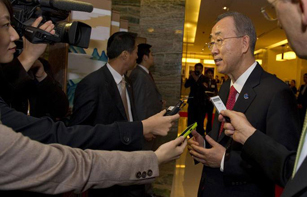
Secretary-General Ban Ki-moon speaks to reporters on arrival in Busan, Republic of Korea, to address the Fourth High-Level Forum on Aid Effectiveness.
Credit: UN News
Some 3500 delegates, including heads of state, ministers, civil society, the private sector and leaders of international organizations have come together for the Fourth High-Level Forum on Aid Effectiveness in Busan, Korea, from 29 November to 1 December to review the impact of development aid and chart a bold course for how the future of development cooperation will support the achievement of the Millennium Development Goals.
Speaking at the opening, UN Secretary General Ban Ki-moon underlined the need to move towards a “new cooperation partnership” based on shared responsibility where traditional donors continue aid programmes despite the economic crisis; where countries receiving aid set clear development priorities, deliver on commitments and work more with civil society; and where emerging aid donors and the private sector increase aid efforts and commitments.
"Our agenda today is very clear," Ban said. "We are here to ensure that aid reaches those most in need, the most vulnerable people who we have to take care of."
Underlining how commitment to development assistance has helped to slow the spread of HIV and reduce child mortality, the Secretary General emphasized the urgent need to continue support for “highly productive multilateral initiatives such as the Global Fund to Fight AIDS, TB and Malaria.”
Towards a “new global partnership for development” the Secretary General stressed three principles as the basis for effective aid: accountability, flexibility and ownership.
“Countries that are accountable, countries that receive flexible aid, countries that have the most ownership -- will be best placed to achieve the best results,” he said.
New partnership for Africa’s development
In Busan on Tuesday 29 November, UNAIDS Executive Director Michel Sidibé stressed that the time is right for new paradigms for international development cooperation to transform the concept of aid effectiveness. Mr Sidibe spoke at a side event on the impact of development aid in Africa, organized by the New Partnership for Africa’s Development (NEPAD) and the United Nations Development Programme (UNDP).
Our agenda today is very clear," Ban said. "We are here to ensure that aid reaches those most in need, the most vulnerable people who we have to take care of
UN Secretary General Ban Ki-moon
“At this game-changing moment in the AIDS response, today’s development paradigms look tired and confused – no longer responding to the needs of a changing world,” said Michel Sidibé, UNAIDS Executive Director. “We need to broaden the discourse beyond a focus on just financial sustainability. A socially sustainable agenda for Africa must be agreed upon in Busan.”
Although sub-Saharan Africa remains the region worst-affected by HIV with nearly 70% of the 34 million people living with HIV worldwide, the countries of sub-Saharan Africa have the potential to lead the AIDS response as they have increased access to technology, economic growth and a growing workforce, he stressed.
Youth as ‘transformers’
Mr Sidibé also joined the Korean Minister of Education, Science and Technology, Dr LEE Ju-Ho, at the Youth Forum to hear the perspectives of young people on effective aid and development. The Youth Forum, hosted by the Korean government and organized by the Korean National Commission for UNESCO, addressed ways to increase young people’s participation in aid and development.
Speaking to young people at the opening of the Youth Forum, Mr Sidibé said, “You are not spectators in development architecture—you are transformers. You are the leaders of today - transforming the world and the way development is done through your bold ideas and the innovative use of technology.”
Calling on young people to engage in the development of UNAIDS’ new youth strategy, Mr Sidibé highlighted how social media is a powerful tool for development and innovation. UNAIDS is using crowdsourcing to empower young people, including young people living with HIV, to take ownership and develop the strategy online. To participate in this initiative, go to www.crowdoutaids.org.




